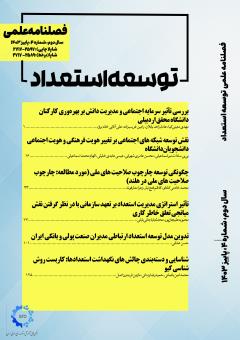تاثیر استراتژی مدیریت استعداد بر تعهد سازمانی با در نظر گرفتن نقش میانجی تعلق خاطر کاری
محورهای موضوعی : New theories and models of human resource training and developmentمحدثه باباجانی بابلی 1 , محبوبه علیجان پور 2
1 - دانشگاه آزاد اسلامی واحد ساری
2 - دانشگاه آزاد تهران مرکز
کلید واژه: مدیریت استعدادتعهد سازمانی تعلق خاطر کاریدانشگاه مازندران,
چکیده مقاله :
دانشگاه ها و مراکز آموزش عالی به دلیل تربیت و پرورش نیروهای متخصص و ماهر نقش بسزایی در پیشبرد اهداف جامعه دارند. این سازمان ها برای تداوم رسالت خطیر خود که همانا بهبود کیفیت آموزشی و ارتقاء علمی در سطح ملی و بین المللی نیازمند کارکنان متعهد و توانمند هستند. بدین منظور یکی از راهکارهایی که بتوان با به کارگیری آن نتایجی چون افزایش تعلق خاطر کاری و تعهد سازمانی کارکنان را دنبال کرد، مدیریت استعدادها در آن سازمان می باشد. این پژوهش با هدف بررسی تاثیر استراتژی مدیریت استعداد بر تعهد سازمانی با نقش میانجی گری تعلق خاطر کاری در بین کارکنان دانشگاه مازندران انجام گرفته است. جامعه آماری تحقیق شامل کلیه کارکنان دارای مدرک دیپلم و بالاتر دانشگاه مازندران که تعداد آنها 540 نفر بوده و با استفاده از فرمول کوکران 225 نفر به روش تصادفی ساده به عنوان نمونه انتخاب شدند. روش تحقیق از نظر هدف، کاربردی و از نظر روش گردآوری داده ها، توصیفی- پیمایشی است. ابزار جمع آوری اطلاعات شامل سه پرسشنامه استراتژی مدیریت استعداد سوئیم(2009)، تعهد سازمانی آلن و می یر(1990)و تعلق خاطرکاری شاوفلی و همکاران(2003) می باشد. جهت تجزیه و تحلیل داده ها از تکنیک روش مدل یابی معادلات ساختاری و روش حداقل مربعات جزئی استفاده گردیده است. نتایج پژوهش حاکی از برازش مناسب مدل مفهومی ارائه شده است که در آن تعلق خاطر کاری در تاثیر استراتژی مدیریت استعداد بر تعهد سازمانی کارکنان نقش میانجی را ایفا می کند. همچنین نتایج آزمون فرضیه ها نشان دهنده تاثیر مثبت استراتژی مدیریت استعداد بر تعهد سازمانی و تعلق خاطر کاری و تاثیر مثبت تعلق خاطر کاری بر تعهد سازمانی کارکنان می باشد.
Universities and higher education institutions play a key role in advancing a society’s goals as they intend to educate and train skilled and expert forces. These organizations require committed and competent staff in order to accomplish their great mission. For this purpose, talent management strategy is considered one of the strategies which helps any organization increase work engagement and organizational commitment amongst the staff. The present research aimed at examining the effect of talent management strategy on organizational commitment with the mediating role of work engagement amongst the staff in Mazandaran University. The statistical population comprised all staff with high school diploma or higher degrees (n= 540) working in Mazandaran University out of whom 225 participants were randomly selected as the research sample size using Cochran’s formula. This is an applied research in terms of its aim and a descriptive survey with regard to methods used for data collection. The tools for data collection included three questionnaires: Swim’s Talent Management Strategy Questionnaire (2009), Allen & Meyer’s Organizational Commitment Scale (1990), and Work Engagement Scale by Schaufeli et al. (2003). Structural equation modeling technique and partial least squares regression were applied to analyze the data. The results indicated a good fit of conceptual model presented in which work engagement played a mediating role in the effect of talent management strategy on organizational commitment amongst the staff. Moreover, the results from hypotheses testing showed the positive effect of talent management strategy on organizational commitment and work engagement as well as positive effect of work engagement on organizational commitment amongst the staff.
